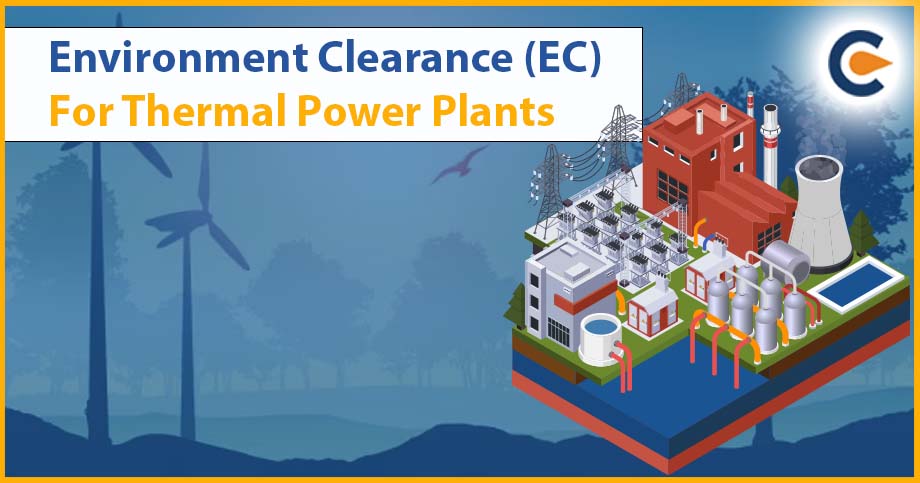Environmental clearance (EC) for thermal power plants is mandatory under the Environmental Impact Assessment (EIA) Notification of 2006, further amended in 2020. The EIA Notification provides a framework for the environmental clearance process for all developmental activities, including thermal power plants.The process of EC forThermal power plantis carried out by the country’s regulatory agency responsible for environmental protection. The agency may require the power plant developer to conduct environmental impact assessments, public hearings, and consultations with stakeholders, including local communities and environmental groups. The regulatory agency may grant EC for thermal power plants subject to certain conditions that the developer must comply with during the construction and operation of the plant. Failure to comply with these conditions may result in penalties or even the revocation of the environmental clearance.
Laws Related To EC for Thermal Power Plants
In India, the laws governing the environmental clearance for thermal power plants are primarily contained in the Environmental Impact Assessment (EIA) Notification, 2006, issued by the MoEF&CC.
- The EIA Notification, 2006, requires thermal power plants to obtain EC from the MoEF&CC or the State Pollution Control Board (SPCB) before starting any construction activity or operation. The notification also specifies the process and procedures for obtaining environmental clearance.
- The EIA Notification, 2006, was amended in 2020 to include more stringent environmental norms for such power plants. The amendment introduced more detailed guidelines for assessing the environmental impact of the power plants, including new requirements for monitoring air and water quality and for the disposal of fly ash.
- In addition to the EIA Notification, 2006, the power plants must comply with other laws and regulations governing environmental protection, such as the Water Act, 1974, the Air Act, 1981[1], and the National Green Tribunal Act, 2010.
- The National Green Tribunal (NGT) is a specialized court that hears environmental protection and conservation cases. It has the power to hear cases related to the violation of environmental laws and to impose penalties and other measures to ensure compliance.
Documents Required For Obtaining EC of Thermal Power Plant
The following documents are generally required for obtaining EC for Thermal Power Plants in India:
- Application Form: The application form must be duly filled and signed by the company’s authorized signatory.
- Project Report: The project report should provide detailed information about the proposed thermal power plant, including its location, size, capacity, and technology used.
- Environmental Impact Assessment (EIA) Report: The EIA report should assess the potential environmental impacts of the proposed project, including air and water pollution, land use, and the impact on flora and fauna.
- Environmental Management Plan (EMP): The EMP outlines the measures the thermal power plant will take to mitigate its environmental impact, including controlling air and water pollution, managing waste and hazardous materials, and conserving natural resources.
- Consent from State Pollution Control Board (SPCB): The thermal power plant must obtain consent from the SPCB in the state where the plant is located, which certifies that the plant is complying with the state pollution control laws.
- NOC from Local Authorities: The thermal power plant must obtain a No Objection Certificate (NOC) from the local authorities, certifying that the plant complies with the local land-use regulations.
- Public Hearing Report: The Public Hearing report documents the feedback and concerns expressed by the public during the public consultation process.
- Financial Statement: The financial statement should provide information about the project cost and the source of funds.
Any other relevant documents that the MoEF&CC or the SPCB requires.
Note: The documents required may vary depending on the size, location, and capacity of the thermal power plant, as well as the specific environmental regulations in force at the time of application.
Process of EC for Thermal Power Plants
Environmental clearance is a mandatory process that thermal power plants must undergo before they can begin operations. The process ensures that the power plant complies with environmental regulations and does not harm the environment.
The environmental clearance process involves several steps, including:
- Submission of An Application: The power plant must apply to the Ministry of Environment, Forest and Climate Change (MoEF&CC) or the State Pollution Control Board (SPCB), where the plant is located.
- Environmental Impact Assessment (EIA): The EIA report is prepared by the power plant, which assesses the potential environmental impacts of the proposed project. The report includes information on air and water pollution, land use, and the impact on flora and fauna.
- Public Consultation: The public can provide feedback on the project during public consultation meetings. Public Consultation is a crucial step in the EC for Thermal Power Plants process, allowing stakeholders to voice their concerns and provide feedback on the proposed project.
- Review and Clearance: The MoEF&CC or SPCB will review the EIA report and feedback from the public consultation meetings and decide whether to grant clearance.
Once environmental clearance is granted, the power plant must comply with the conditions set out in the clearance letter. These conditions typically include air and water quality monitoring and adherence to specific emission standards. It is important to note that environmental clearance is not a one-time process. The power plant must regularly submit reports to the MoEF&CC or SPCB to ensure ongoing compliance with the conditions.
Conclusion
Thermal Power Plants have a detrimental effect on Air pollution and put Human health at stake. The introduction of EC for Thermal Power Plants has proved to be a crucial requirement for constructing and operating such power plants in many countries, including India. EC is essential for protecting the environment and public health and ensuring compliance with regulations. Obtaining Environmental Clearance and complying with all regulations is a pervasive process. Therefore, it is always recommended to seek professional advice from experts in this area.
Also Read:
Types Of Environmental Impact Assessment
Environmental Clearance Process In India: A Complete Outlook
Imposition Of Environmental Compensation Under Plastic Waste Management Rules











